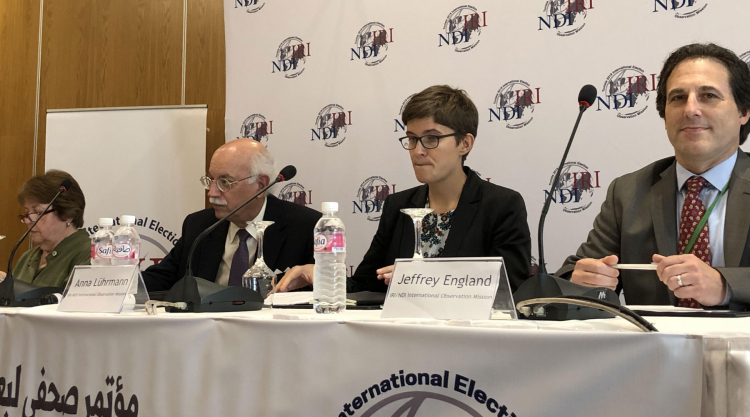Tunisia: Competitive Parliamentary Elections Set Stage for Presidential Runoff
TUNIS, Tunisia — Today, the National Democratic Institute (NDI) and the International Republican Institute (IRI) joint international Election Observation Mission, released its preliminary statement following Tunisia’s parliamentary elections. The delegation, led by Andrew Natsios, former administrator of the U.S. Agency for International Development and a professor at the George H. W. Bush School at Texas A&M, and Anna Lührmann, former member of the German parliament and deputy director of the Varieties of Democracy (V-Dem) Institute, issued short and long-term recommendations.
Overall, Tunisians were able to participate in a well-administered election despite a shortened electoral timeline and confusion created by the overlapping presidential election and runoff. Despite continued frustrations with stalled reforms, persistent corruption and an ongoing economic crisis, over 41 percent of the seven million Tunisians registered to vote participated in Sunday’s parliamentary elections.
“Tunisia is the one shining example of democratic progress in the region. In other countries, people are getting killed for demanding basic rights, but in Tunisia, people are voting,” said Natsios. “Research shows that if there are four elections over a twelve to fourteen year period, and a change of political parties at least twice, the chances for democracy to take root permanently are very high.”
“Tunisia’s presidential and parliamentary elections are a democratic milestone, and are the first transfer of power from one democratically elected government to another since the 2014 Constitution,” said Lührmann. “However, what happens after the election is critical for the ultimate success of the Tunisian revolution. The next parliament needs to demonstrate swiftly that democracy can deliver for the next generation by addressing social and economic challenges.”
On election day, the mission delegates visited more than 150 polling stations in 25 electoral districts across the country. The joint mission stresses that the statement is preliminary and that, ultimately, it is the people of Tunisia who will determine the credibility of these elections. In the spirit of international cooperation, the IRI/NDI joint international election observation mission, comprising 34 observers from 15 countries, issued these short-term recommendations on how to strengthen the election process:
- The judicial system and election authorities should work together to ensure a level playing field where every appropriate effort is made to enable all eligible candidates to campaign, have fair access to the media and inform voters.
- Election officials should ensure unimpeded access to polling stations and relevant data for citizen observers.
- Election officials should provide systematic, comprehensive and timely information about any violations detected, complaints received or sanctions imposed and ensure equitable enforcement of regulations.
- Election officials should release detailed information about their media monitoring efforts, including any violations detected, the scale and nature of these violations and sanctions imposed against violators.
Over the longer term, all actors have a responsibility to continue working to enhance both the quality of the electoral process and voter confidence in the polls and broader political processes they impact. To this end, the mission highlights several longer-term recommendations:
- Candidates should use available legal remedies to address any concerns and ensure that election violations are properly documented and substantiated.
- To allow for timely and efficient enforcement of regulations and appropriate reimbursement for contestants, campaign finance matters, in particular, must be adjudicated within a shorter and well-defined period of time.
- A subdued campaign may result in a reduced turnout, and Tunisian authorities and political parties should review campaign laws and regulations to encourage a lively and informative campaign period.
- After the next parliament is inaugurated, members should make all efforts to reinstate the Constitutional Court as mandated under the Constitution.
- The electoral framework should be thoroughly reviewed and amended as appropriate to include revisions to the seat allocation system, media regulations, campaign financing, campaign restrictions and duration and candidacy eligibility, as well as to address a high number of effectively disenfranchised voters and the potential to combine election dates for logistical ease and voter engagement.
